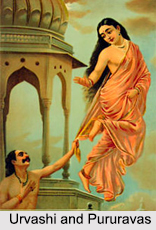 Urvashi is an Apsara or a nymph in the Hindu epic of "Mahabharata". She was a celestial maiden in Lord Indra"s court and was considered the most beautiful of all the Apsaras. She was the wife of king Pururavas, an ancient chief of the lunar race and treated in Kalidasa`s drama "Vikramorvasiya". Urvashi is perennially youthful and infinitely charming but always elusive. The word "Urvashi" literally means "someone who controls the heart". She is a source as much of delight as of dolour.
Urvashi is an Apsara or a nymph in the Hindu epic of "Mahabharata". She was a celestial maiden in Lord Indra"s court and was considered the most beautiful of all the Apsaras. She was the wife of king Pururavas, an ancient chief of the lunar race and treated in Kalidasa`s drama "Vikramorvasiya". Urvashi is perennially youthful and infinitely charming but always elusive. The word "Urvashi" literally means "someone who controls the heart". She is a source as much of delight as of dolour.
Birth of Urvashi
There are many legends about the birth of Urvashi. Once the revered sages Nara-Narayana was meditating in the holy shrine of Badrinath Temple situated in the Himalayas. Indra, the king of the Gods, did not want the sage to acquire divine powers through meditation. The sage struck his thigh and created a woman so beautiful that Indra"s apsaras were left matchless. This was Apsara Urvashi who was named from "uru", the Sanskrit word for thigh.
Legend of Urvashi and Pururavas
Pururavas was a very strong king who ruled the earth. Once Urvashi got bored of the heaven and came down to earth along with her friends to enjoy. While returning from earth, during dawn, she was kidnapped by an Asura named "Keshi". Pururavas was driving his chariot through a forest. He suddenly found that a demon was abducting an Apsara. Pururavas defeated the demon and rescued Urvashi. He restored her to Indra, the king of the Gods. Indra was delighted at this act and Indra and Pururavas became friends.
To celebrate Urvashi"s return, Indra asked Sage Bharata to stage a performance. Menaka, Urvashi and Rambha were asked to perform. But Urvashi was attracted by King Pururavas and kept looking at him and as a result she fell out of step. This angered Bharata and he cursed Urvashi that she would have to spend 55 years on earth.
Urvashi came to earth looking for Pururavas and they confessed their feelings for each other. She stayed with Pururavas for the rest of life, but with a few conditions. The day any of the conditions were surpassed, Urvashi would have to leave for the heavens. Pururavas agreed to all the conditions and they started living together at the Gandhamadan garden.
The Gods, on the other hand, became very jealous of the love between Urvashi and Pururavas. So, they decided to hatch a plot and bring back Urvashi to heaven. One of her condition was surpassed and Urvashi had to go back to heaven. At that time, however Urvashi carried the child of Pururavas. Later, Urvashi came to the Earth many times and bore Pururavas many more children. On earth, Urvashi married Pururavas and they had six sons named Ayu, Amavasu, Vishvayu, Shrutayu, Shatayu and Dridhayu.









